#latin literature
Text



The Holdovers (2023) by Alexander Payne
Book title: Meditations (Τὰ εἰς ἑαυτόν in Ancient Greek; 180 A.D.) by Marcus Aurelius
#books in movies#latin literature#the holdovers#paul giamatti#dominic sessa#alexander payne#da'vine joy randolph#meditations#marcus aurelius
904 notes
·
View notes
Text
Winnie Ille Pu
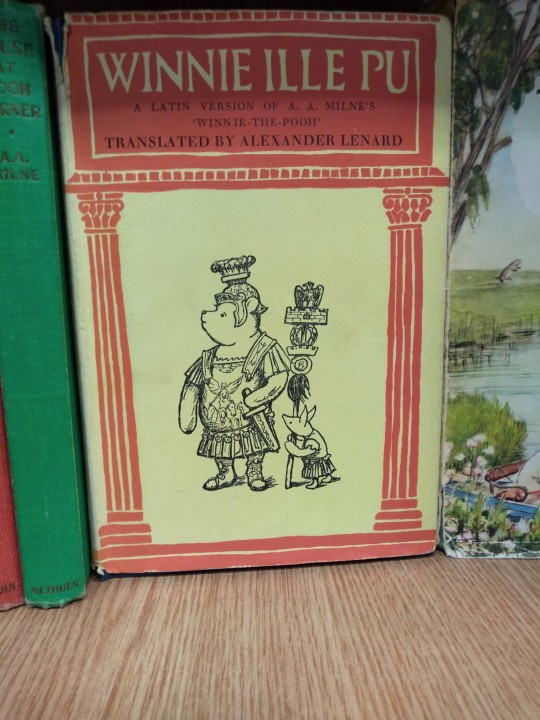
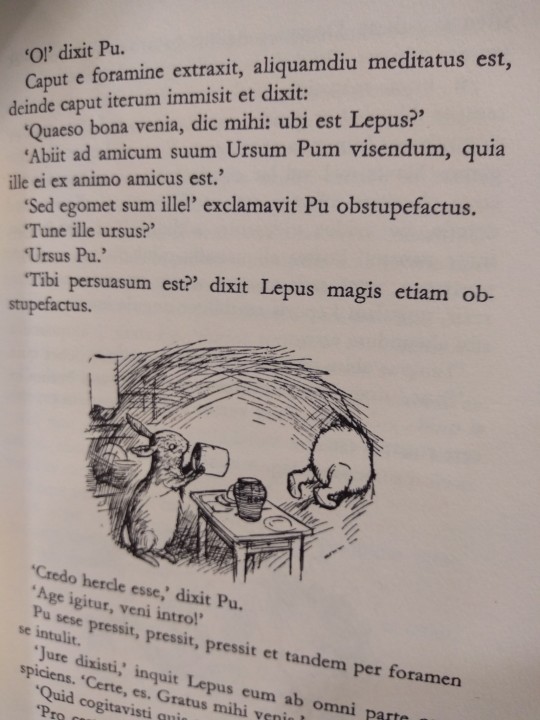
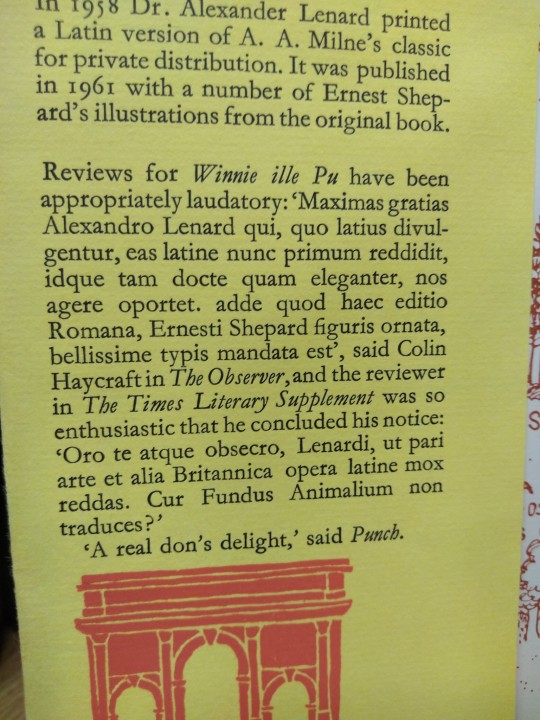

Who the heck translated Winnie the Pooh into Latin. Why would you ever do that.
(It is a rhetorical question: I am aware of the translator on the cover.)
I found another Pooh book in Latin!
#winnie the pooh#latin language#latin literature#Latin#translation#what the fuck#what the heck#booknerd#books#book#500 likes#somehow#1k#HOW#latin#latin fandom#latin memes#latina#books and ideas#books and reading#reading#2k#HOW SERIOUSLY DID I GET ALL THE LATIN FANS HERE OR SMTH#AAAAAAAAAAAAAAAAAA
5K notes
·
View notes
Text
I stg if I see one more "Justice for medusa's TRUE story!" post I'm gonna kill someone.
(TW: Assault mention)
The medusa is assaulted by posidon then cursed by athena for being assaulted in her temple only appears in Ovid's Metamorphoses, which is written as a purposeful subversion of Greco-roman myths. most are reframed or rewritten from just kinda a thing that exists or a black and white moral tale of why you shouldn't be hubristic to full on tragedies on the part of the person often getting their comeuppance or the monster. Heck in book 13 we get a love story starring Polyphemus, the cyclops from the Odyssey.
In general mythology, Medusa is just another monster. Ovid revises the myth to turn it into a tragedy. I absolutely love ovid's work, he does so many clever things with the myths, but for the love of the gods its the furthest from the real version you can get
#And yeah obviously its greek mythology so theres no set canon and you can kind of pick and choose tellings#but Ovid's one isn't a tradition of belief its just literature#its damn good literature but in terms of religion its like claiming good omens is part of the christian canon#classics#ancient history#tagamemnon#ancient rome#greek mythology#medusa#ovid#latin literature#ancient greece#mythology
407 notes
·
View notes
Text
As late as the fourth century CE in a satire attributed to the emperor Julian, Octavian (the later Augustus) is described as “changing many colors, like a chameleon: becoming now pale and now red”. In the satire, the god Silenus reacts to seeing Octavian by saying, “Bless me, what changeable beast is this! What terrible thing will he do to us!”
For comparison we have Pliny the Elder's comment on chameleons from his Natural History 8.120: "And [the chameleon] is more miraculous for the nature of its color, for it constantly changes its eyes and tail and entire body, and always resembles whatsoever it touches last, except red and white”
Pliny’s mention of the chameleon’s inability to turn “red and white” (rubrum candidumque) makes Julian’s description of Octavian turning pale (ὠχριῶν) and red (ἐρυθρὸς) take on a greater significance because it shows that Octavian is then more skilled than a chameleon at changing color by possessing the capability to turn both red and white.
Although Silenus' comment makes it clear that Octavian's color-changing should be seen as a reflection of his instability and danger, the change in color could also be an allusion to Octavian's constant change in health as ὠχριῶν refers to becoming pallid. Pliny further strengthens this reading by writing that when dead, chameleons are pale (defuncto pallor est). Thus Octavian is constantly changing between a state of near-death and great vitality as implied by Julian's ἐρυθρὸς and Pliny's rubrum, both of which can mean having a ruddy complexion.
#tagamemnon#Octavian#Augustus#pliny the elder#Julian the Apostate#Roman history#Latin literature#Ancient Greek
226 notes
·
View notes
Text
If the Aeneid has a million fans, I'm one of them
If the Aeneid has one fan, I'm that one
If the Aeneid has no fans, my soul, indignant, has fled down to the underworld with a sigh
#tagamemnon#classics memes#ancient rome#latin literature#the aeneid#virgil#latin#ancient literature memes#vergil#publius vergilius maro#Aeneid posting specifically for mx thoodleoo
464 notes
·
View notes
Text
once i start posting in latin it’s over for y’all
#i feel like we as a society must stop recognizing english as a universal tongue and go back to latin#tagamemnon#classics#classical literature#the aeneid#greek mythology#latin literature#roman mythology#latin#latin language#lingua latina
73 notes
·
View notes
Text
Per aspera ad astra. I’d heard a variety of translations, but the one I liked best was Through the thorns, to the stars.
If We Were Villains, M. L. Rio
#if we were villains#ml rio#iwwv#iwwvedit#iwwv spoilers#iwwv quotes#oliver marks#james farrow#jamesoliver#shakespeare#Murder mystery#dark academia quotes#dark academia#academia aesthetic#theatre#latin literature#latin#latin language
470 notes
·
View notes
Text
On they went then in darkness, through the lonely
Shadowing night, a nowhere of deserted dwellings,
Dim phantasmal reaches where Pluto is king--
Like following a forest path by the hovering light
Of a moon that clouds and unclouds at Jupiter's whim,
While the colours of the world pall in the gloom.
Seamus Heaney, Aeneid Book VI
#Seamus Heaney#The Aeneid#Virgil#darkness#night#Pluto#Underworld#Jupiter#moon#moon quotes#full moon#epic poetry#epic poem#Latin literature#poetry#poetry quotes#quotes#quotes blog#literary quotes#literature quotes#literature#book quotes#books#words#text
19 notes
·
View notes
Text
difficilis facilis, iūcundus acerbus es īdem:
nec tēcum possum vīvere, nec sine tē.

unbearable and agreeable, you are both pleasant and bitter in equal measure:
I can neither live with you, nor without you.
#this is martial epigrams 12.46 btw#we were studying it and I was like. omg#shoutout to runner-up in the macdennis roman poetry competition: catullus poem 85!!#aka odi et amo#macdennis#iasip#sunny#it’s always sunny in philadelphia#latin literature#latin#martial#roman literature#latin poetry#roman poetry
17 notes
·
View notes
Text
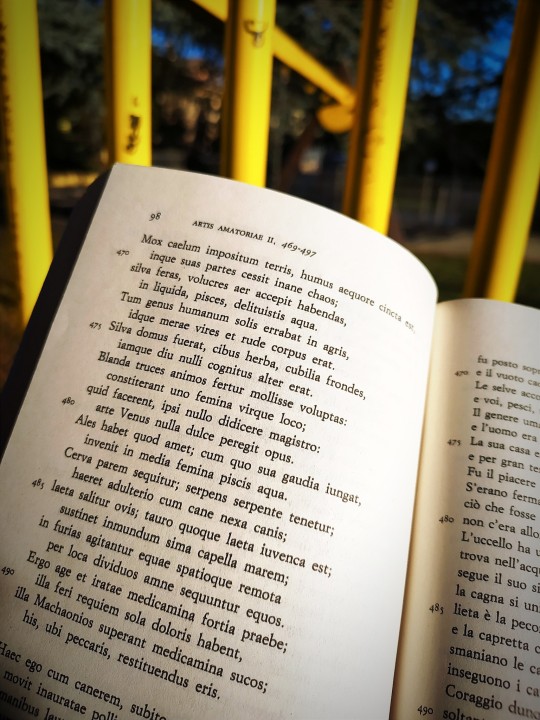
«Silva domus fuerat, cibus herba, cubilia frondes,/ iamque diu nulli cognitus alter erat./ Blanda truces animos fertur mollisse voluptas:/constiterant uno femina virque loco;/ quid faceret, ipso nullo didicere magistro:/ arte Venus nulla dulce peregit opus.»
Translation:
"His house (of the man, mankind) was the forest, grass was his food, leaves his bed, and for a long time every man was unknown to the other. It was the pleasure of Love - it's said- to placate the wild spirits. They stopped, the man and the woman, in the same place; they learned their way what they should do, without any teacher; back then there was no "art", but Venus did her sweet duty"
Ovidius- Ars Amatoria (II, 475-480)
#love#ancient history#ancient literature#latin literature#literature#love quotes#quotes#ancient rome#art#music#ovidio#ovidius#classic#classicism#ancient greece#greek mythology#roman reigns#roman empire#ancient languages#classical antiquity#translator#translation#exams#university#university student#literature major#catullus#cicero#writers and poets#poetry
28 notes
·
View notes
Text
My number one classics ick is when a scholar will just insert untranslated passages of Greek and Latin into their paper. good job on the artificial inaccessibility you guys, glad you were able to gatekeep the field so none of those dirty peasants may learn stuff. its just for us cool guys who speak Greek or Latin
#This is my speaking as a classical archaeologist who can read very rudimentary Latin and pretty much no Greek#I just never got offered the classes and they weren't a requirement#I'd love if I could and I've been trying to learn latin on my own for a while but self teaching a language isn't exactly easy#I know just enough that if I find a translation that feels off I can get a dictionary and the original and see how it might be phrased#I do need a second translation too to help me find my way#classics#ancient history#tagamemnon#ancient rome#ancient greece#latin#latin literature#greek#greek literature#academics#ick
152 notes
·
View notes
Text
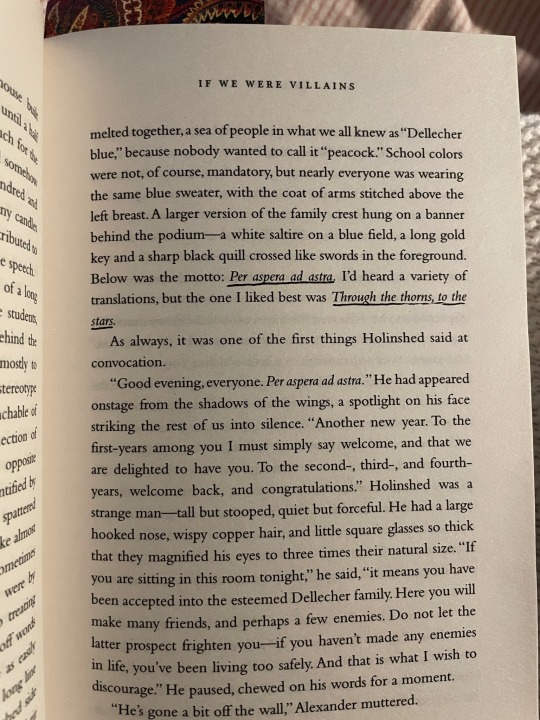
I really want to learn Latin
23 notes
·
View notes
Text
in the ode to Venus in “de rerum natura” by Lucrezio, there’s a passage in which the author asks Venus to keep Mars at bay, for art cannot prosper under war. and he does so by saying she knows how to placate Mars: by letting him lay on her bosom, his neck stretched backward, looking at her, gapingly, his breath hanging upon her lips and I swear to God that’s how I imagine Anakin: sprawled on Obi-wan’s lap, being tormented by the war inside himself, but as soon as he gazes into obi-wan’s eyes, everything goes quite and calm. He can only sense the peaceful, grounding, safe love he feels for his soulmate. There’s no yesterday and no tomorrow, there is only Obi-wan’s fond, gentle glance, promising Anakin will always have a place to return to and to feel safe. And after all, Anakin ponders, we all feel most secure at home; I’m glad mine has greyish eyes with green speckles and strong yet gentle arms. Then he dozes off lulled by his beloved calming breath.
“Nam tu sola potes tranquilla pace iuvare
mortalis, quoniam belli fera Mavors
armipotens regit, in gremium qui saepe tuum se
reicit aeterno devictus vulnere amoris,
atque ita suspiciens tereti cervice reposta
pascit amore avidos inhians in te, dea, visus,
eque tuo pendet resupini spiritus ore.”
“For thou alone hast power with public peace
To aid mortality; since he who rules
The savage works of battle, puissant Mars,
How often to thy bosom flings his strength
O'ermastered by the eternal wound of love-
And there, with eyes and full throat backward thrown,
Gazing, my Goddess, open-mouthed at thee,
Pastures on love his greedy sight, his breath
Hanging upon thy lips.”
#obikin#star wars#anakin skywalker#obi wan kenobi#obi wan#anaobi#latin literature#i only learn about literature so i can apply it to my fave ships
15 notes
·
View notes
Text
I have a vision. Logan Lerman as Aeneas
#virgil is speaking through me actually listen#queueusque tandem abutere catilina patientia nostra#tagamemnon#the aeneid#classical mythology#classical literature#classics#latin literature
21 notes
·
View notes
Text
Rating all the Latin authors I've read in the past two years in honor of my oral Latin exam tomorrow
Caesar (De Bello Gallico)
This is a weird one because while his prose isn't extremely difficult, it was also the first unedited work I read, so for lil 15-year-old me, this was very difficult. But I learned a lot from Caesar (especially that he made it an art to making his sentences as long as possible. We read an entire 200 words, and IT WAS JUST ONE SENTENCE.), and the sense of nostalgia while rereading it is very pleasant, so I will give you a solid 6/10
Pliny the Younger (Epistulae)
Mixed feelings about this one again. This could also be just because I despise prose. I really do not like it at all. Pliny's epistulae were pretty okay. I liked them a little better than Caesar's because of their variety (for those that don't know, epistulae means letters). His letter about the Vesuvius was a lot of fun to translate, even with all the hyperbata, but his letters about or to his third wife were very uncomfortable. Like, I get things were different back then. BUT YOU WERE 45, PLINY. 45. SHE WAS WHAT? 14? 15 TOPS? MY GOD. THAT'S A BIGGER AGE DIFFERENCE THAN I HAVE WITH MY FATHER.
7/10
Ovid (Metamorphoses)
Ovid is life Ovid is love. He was the one who introduced me to Latin poetry, and I will always love him for it. He was an icon and a legend. The poems of his that we read (Daedalus & Icarus, Latona and the Lycian peasants, Diana and Actaeon) were all bangers, and I love them all to death. I never wanted to go back to reading prose after this (but unfortunately, I will have to next year. ew)
11/10 (I love you, Ovid)
Vergil (The Aeneid)
*deep sigh* Listen. I love his complex works, and I have great respect for this poem but by the GODS. Vergil's poetry is the most difficult I've had to translate by a long shot. He made me rethink my entire career in Latin. I have considered quitting so many times because of this man. I felt like a complete idiot most of the time. This is not a guy to fuck with. Luckily I got through it on my finals (barely.) but Christ alive this man made my life difficult.
5/10
Horatius (Satires and Odes)
Horatius will always have a special place in my heart. We read his poetry right after Vergil's, and it almost completely restored my faith in my abilities. He's just my little guy and I have fond memories of translating his works. We still know many Latin phrases that he wrote (Carpe Diem being the most famous. Hello, DPS fandom). Also, he and Vergil were most definitely in love. I don't make the rules. I have evidence if you want me to elaborate.
9/10
Catullus (love poems)
Ah, Catullus. Horny poet of the year. Had a wild affair with an older married woman. Nepotism baby. Sappho stan. Didn't know how to budget, but we aren't holding that against him. Just wanted to write poetry and dance (who doesn't, honestly). Gave fuck-all about education. Wrote nearly all of his poetry about the older woman he had an affair with. Might I add that this woman was married to one of his father's bestest buddies? Yeah. Icon. Here's a kid's choice award.
8/10
Martialis (Epigrams)
This dude had ZERO chill. Roasted everyone in the city. Literally, no one is safe. Wasn't afraid to call people out by their real names. Some people allegedly committed suicide after being roasted by this guy. Translating his epigrams gave me more joy than hearing we had seen the end of Vergil. His humour may be a little silly now, but I will not accept any Martialis slander on my blog.
10/10
And that is all folks
#latin student#latin memes#latin literature#publius ovidius naso#classics#ancient greek#martialis#how is that not a tag#this guy is the epitome of Tumblr humour#pliny the younger#pliny#julius caesar#roman history#roman literature#catullus#vergil#the aeneid#vergil and horatius were gay and in love pass it on#horatius
43 notes
·
View notes
Text
Do you ever think about how Dido and Aeneas are really just literary foils of one another. Like, both characters are refugees trying to defend and support their respective peoples, even if it means colonising the land of other nations, both are manipulated by the gods and, unsurprisingly, both are utterly suicidal because of it, to say nothing of the crushing burden of the duty of leadership.
#dont attack my precious aeneas and dido#two poor souls trying to do their best in a profoundly messed up world#aeneid#dido#tagamemnon#classics#latin literature
12 notes
·
View notes